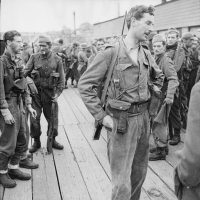Tag: David Rowland
-

The Stress of Battle – Pt5 Operational Research on WW2 Heroism
This is the fifth and final part of my extended review of The Stress of Battle by David Rowland. It is such a strong piece of operational research on WW2 heroism that I thought that it would be useful for wargame designers (and players) to understand what the research evidence is for what went on in WW2 battles. This…
-
The Stress of Battle – Part 4 – Op Research on Anti-Tank Combat
This is the fourth part of my review of The stress of battle: quantifying human performance in combat by David Rowland, which is an essential piece of Operational Research on WW2 and Cold War combat operations. This part covers the findings on anti-tank combat. Anti-Tank Combat Unlike small arms, the effectiveness of weapons used for anti-tank combat has changed considerably over the course of the…
-
The Stress of Battle – Part 3 – Op Research on Terrain Effects
This is the third part of my extended review of The Stress of Battle by David Rowland. It is such a strong piece of operational research that I thought that it would be useful for wargame designers (and players) to understand what the research evidence is for what went on in WW2 battles. Fighting in…
-
Stress of Battle – Part 2 – Op Research on Urban Battles
This is the second part of my review of The stress of battle: quantifying human performance in combat by David Rowland, which is an essential piece of Operational Research on WW2 and Cold War combat operations. For this part I thought that I would focus on the lessons on urban battles. Rowland and his team used…
-
Book Review – The Stress of Battle by David Rowland (Part 1)
Not exactly a book review, more of a synopsis of a great work of Operational Research by David Rowland. The Stress of Battle: Quantifying Human Performance in Combat is the end result of years of work by David Rowland and his team at the Ministry of Defence. Rowland was the father of historical analysis as…